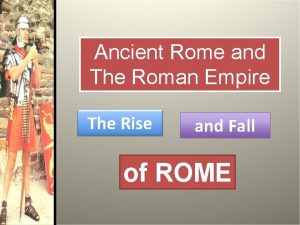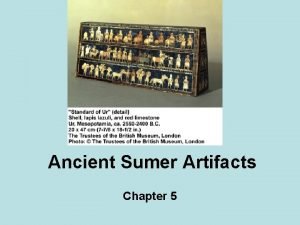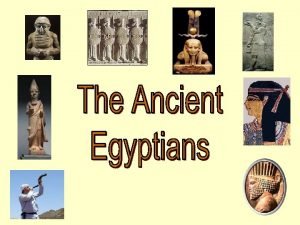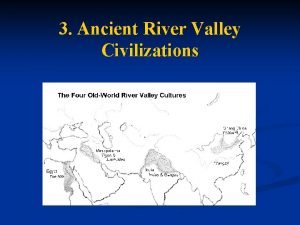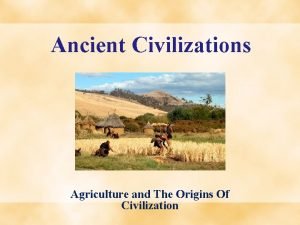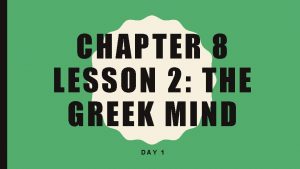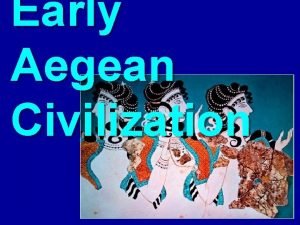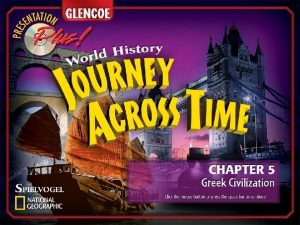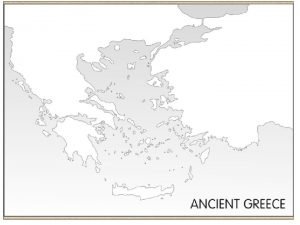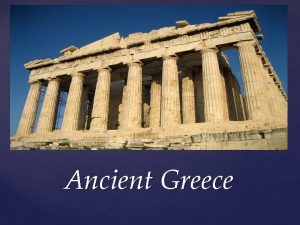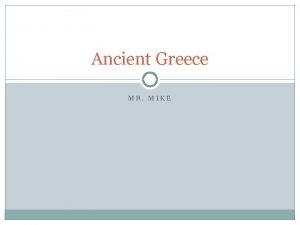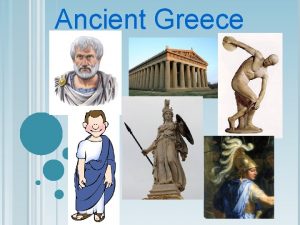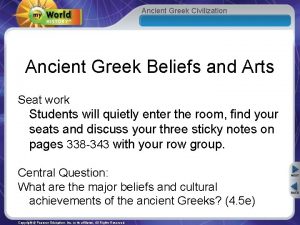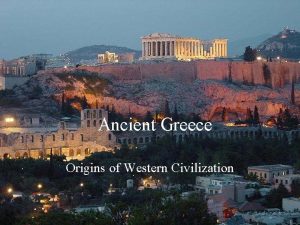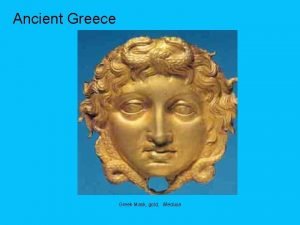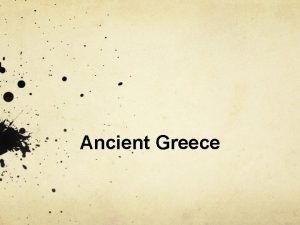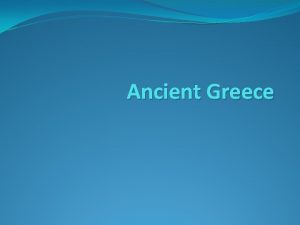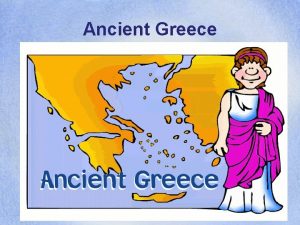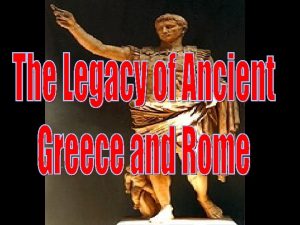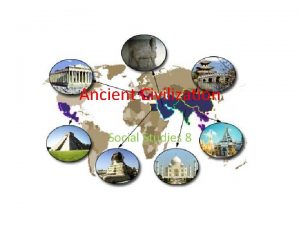Ancient Greece Review Rise Of Greek Civilization Greece

















- Slides: 17

Ancient Greece Review

Rise Of Greek Civilization Greece was the first civilization to develop in Europe in the westernmost part of Asia. It started in an area dominated by mountains and seas. Greece’s mainland is on a peninsula named Europe’s Balkan Peninsula. Most ancient Greeks settled in farming communities. They grew wheat, barley, olives, and grapes. They also raised wildlife like sheep and goat. Greece’s first civilization developed on the island of Crete. It was called the Minoan civilization. Next was the Mycenaean. They were traders and warriors. It began to decline when a dark age began. After recovering from that, the population grew so colonies were established. Greek communities were separated so they were city-states. All city-states were called a polis. All city-states had an agora or marketplace. The army was a phalanx.

Rise Of The Greek Civilization Picture This is a map of Ancient Greece.

Sparta and Athens: City-State Rivals Farmers, merchants, and artisans wanted a political change. This growing unrest led to the rise of tyrants. Most tyrants ruled fairly. Greeks started to want to participate in leading. Then city-states either became oligarchies or democracies. The city-states of Athens and Sparta had two quite different governments. Sparta had a strong military. They treated boys harshly and prepared them for war. They are this way because their helots tried to revolt. Sparta’s government was an oligarchy. Two kings ruled but had little power. Ephors collected taxes. Athens educated and taught their boys. They finished school at age 18. Athens was a democracy.

Sparta and Athens: City-State Rivals This is a map of Athens. It shows the city’s places such as an agora.

Greece and Persia During the time Athens was undergoing political changes, Persia was making their empire the best in Southeast Asia. The Persians lived in Persia which is modern day Iran. In 500’s B. C. , a talented king named Cyrus the Great built a strong army. They conquered many lands like Mesopotamia, Syria, Judah and the Greek citystates. As the empire expanded, the size made it hard to rule. To make it better Darius I created satrapies. He called the governor of each satrapy a satrap. Sometime in 600 B. C. a religious teacher name Zoroaster created a religion. It was a monotheistic religion called Zoroastrianism. He taught that there was one supreme lord named Ahura Mazda. The Greeks in Anatolia revolted against their Persian rulers. This started a war between Greece and Persia. The war was held at Marathon. Greece won. After the defeat at Marathon the Persians vowed revenge against Greece. This was the war at Thermopylae. The Persians won. The decline of Persia came when it was weak and open to attacks.

Greece and Persia Picture This is a map of Persia

Glory, War and Decline As the Persian Wars ended, Athens became a powerful self-confident city-state. Pericles ruled Athens from 461 B. C. to 429 B. C. Under his rule they enjoyed a golden age of prosperity and achievement. Athens practiced democracy. It became the economic and cultural center of ancient Greece. The democratic system was something Athens took great pride in. They had a direct democracy which is when all the citizens of Athens played a part in its government. That is the opposite of a representative democracy. A direct democracy worked because there were a relatively small number of citizens. Philosophers also flourished during this time. After the Persian War, they were still a threat to Greece so the Delian League formed. Unfortunately, it failed. As Athens grew in power other city-states like Sparta became worried. Sparta’s allies pressured them to attack Athens. The war was called the Peloponnesian War. Athens lost the war because a plague broke out eliminating many people in Athens. The effects of the war left Greek city-states without their independence.

Glory, War and Decline Picture This is a picture of the Peloponnesian War. This is when Athens and Sparta were at war.

Greek Culture Even though Greek city-states were separate they were united by a common culture. They shared many beliefs and customs like myths. They believed in many Greek gods. They believed they lived on clouds. They performed rituals to win the favor of their god. Many Greeks visited an oracle to learn about the future. Mostly leader and rulers visited for advice. Epics and fables were very important to ancient Greeks. Two very popular epics were called The Iliad and the Odyssey. A popular fable writer was named Aesop. His fables were apart of oral tradition. Greeks also performed the first dramas. The two categories were tragedy and comedy. The ancient Greeks excelled in the arts and literature. They inspired many of the works today.

Greek Culture Picture This is a picture of a statue of the famous fable writer Aesop

The Greek Mind Greeks thought that the human mind was capable of great understanding. During the Golden Age all of the arts flourished. Philosophers also flourished. A group of philosophers named the Sophists were traveling teachers. They were known for teaching rhetoric. Another philosopher was Socrates. He taught using a way of questioning called the Socratic method. Plato is another philosopher. He wrote the work The Republic. Another great thinker was Aristotle. He taught his students the “golden mean”. A Greek named Herodotus was considered to be the “father of history”. Pythagoras invented the Pythagorean Theorem and taught his students that the universe followed the same rules as music and numbers. Hippocrates is a scientist who studied medicine. He invented the Hippocratic Oath. The Greeks made many amazing discoveries.

The Greek Mind Picture This is a picture of the Greek philosopher Socrates.

Alexander’s Empire In 300 B. C. , the Macedonians conquered Greece. When Philip II became king he created a strong army. He planned to destroy the Persian Empire. After conquering Greece he wanted to lead Greece and Macedonia into battle against Persia. Unfortunately, he was killed before he could carry out his plan. After he died his son Alexander became king at 20 years old. In 334 B. C. , Alexander completed his father’s plan by leading soldiers in Asia Minor and battled Persia. His cavalry gave him an advantage. It was called the battle at Granicus. Alexander’s army won against the Persians. When Alexander returned to Babylon he died from his injuries he was only 32 years old. Alexander’s armies spread Greek rule across the world beginning the Hellenistic Era. Alexander left a great legacy.

Alexander’s Empire Picture This is a picture of a statue of Alexander

Hellenistic Culture During the Hellenistic Era, scientists, philosophers, writers and poets moved to Greek cities. Hellenistic rulers supported writers so a lot was made. Comedies became more popular in drama. Scientific inventions and new philosophies were made. Philosophies like Epicureanism and Stoicism were developed. Scientific firsts like the discovery of physics or the Earth’s circumference were also created. Plane and solid geometry were also formed. After Alexander died his empire was divided into four separated kingdoms. They were Macedonia, Pergamum, Seleucid, and Egypt. The capital was Alexandria in Egypt. It was the largest city and had a vast library. Hellenistic culture was very advancing in history.

Hellenistic Culture Picture This is a picture of Alexandria’s famous lighthouse
 Rise and fall of greek civilization
Rise and fall of greek civilization The rise of greek civilization
The rise of greek civilization Sheep become lions
Sheep become lions Tricky dick: the rise and fall and rise of richard m. nixon
Tricky dick: the rise and fall and rise of richard m. nixon Rise again and again until lambs
Rise again and again until lambs Rise and rise again until lambs become lions origin
Rise and rise again until lambs become lions origin The rise of civilization lesson 2 the neolithic revolution
The rise of civilization lesson 2 the neolithic revolution Ancient rome: the rise and fall of an empire cast
Ancient rome: the rise and fall of an empire cast Sumer
Sumer Ancient egypt civilization geography
Ancient egypt civilization geography What is believed to be the 1 stdynasty of ancient china?
What is believed to be the 1 stdynasty of ancient china? Ancient egypt civilization
Ancient egypt civilization Ancient civilization agriculture
Ancient civilization agriculture Lesson 4 classical greek culture answer key
Lesson 4 classical greek culture answer key Guided reading lesson 2 the greek mind
Guided reading lesson 2 the greek mind Aegean civilization
Aegean civilization Greek civilization introduction
Greek civilization introduction Blank map of ancient greece
Blank map of ancient greece







